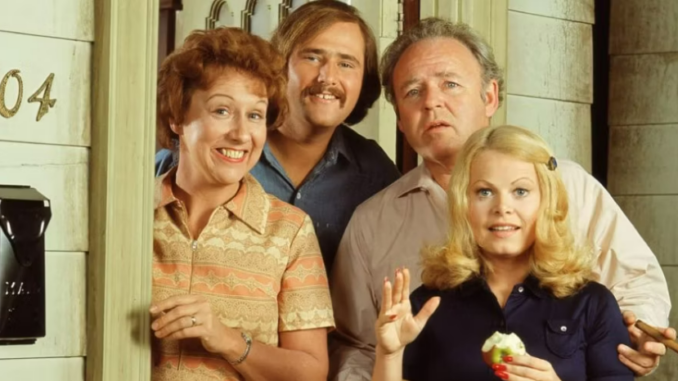
That’s the opening theme to “All in the Family,” which premiered Jan. 12, 1971, 40 years ago today. Revisit the show via DVD or YouTube; it’ll spark an appreciation of what has changed in America and on American TV and what hasn’t — and a realization that a series like this would be unthinkable now.
Developed by Norman Lear, the CBS series revolves around a working-class Queens family: Archie Bunker (Carroll O’Connor); his “dingbat” wife, Edith (Jean Stapleton); his daughter, Gloria (Sally Struthers); his liberal son-in-law, Mike “Meathead” Stivic (Rob Reiner). The plots contain some of the expected sitcom fodder: misunderstandings, silly deceptions, crises that turned out to be no big deal. But the heart of the show was topical humor. The Bunkers and their friends and neighbors debated war, religion, drugs, gun control, sex, sexism, gay rights, race relations, immigration, taxation, the environmental movement and everything else under the sun. The series wasn’t just a situation comedy, it as was an ongoing national conversation rooted in well-written, well-acted, multifaceted characters.
The historical specifics have changed since 1971, and the language we use to describe them has changed, too. But the cultural fault lines and hot-button topics all have modern equivalents. Racial, ethnic and sexual upheaval? Check. Inflation and unemployment? Double checks. Liberal/conservative rancor? And how. Terrorism and war? You better believe it, buddy. (In a 1972 episode, Archie delivered a pro-gun TV editorial that sounded eerily like actual proposals made after 9/11. The solution to skyjackings, Archie told viewers, was to “arm all your passengers … Just pass out the pistols at the beginning of the trip and pick them up again at the end. Case closed.”)
It might be hard for younger viewers to imagine how striking this series was. Prior to the late ’60s and early ’70s, pop culture either made an ostentationally big show of grappling with hot-button topics (usually in Oscar-baiting message films or dour live TV dramas) or plugged its ears and whistled a happy tune. There was a disconnect between how people talked in private (and what they talked about) and what you saw on TV and on movie screens and heard on the radio. In 1969, when Norman Lear received approval from CBS to create an American version of popular British sitcom “Till Death Do Us Part” — the same concept as “All in the Family,” but less elegantly directed and tonally adventurous — the boundaries that once separated socially aware popular art from mainstream entertainment became porous. Entertainment begins to let the world in — and not in dribs and drabs. The floodgates opened. “All in the Family” helped knock them down.
“If your spics and your spades want their rightful share of the American dream, let ’em get out there and hustle for it, like I done,” Archie groused to Mike, who was agitating about civil rights yet again.
“So now you’re going to tell me the black man has just as much chance as the white man to get a job?” Mike demands.
“More,” Archie says. “He has more. I didn’t have no million people marchin’ and protestin’ to get me my job.”
“No,” Edith interrupted. “His uncle got it for him.”
Characters bantered about touchy subjects, often in the presence of the very people who were touchy about them, and they did this in all sorts of TV shows and films, not just ones that were supposed to be Relevant and Important. Gene Hackman’s Popeye Doyle from “The French Connection,” which came out in the fall of ’71, was Archie Bunker’s fantasy supercop, the kind of skull-cracking, pre-Miranda street centurion who would have busted Mike Stivic over the head with a nightstick. (“Um, um, um, um!” Archie says, mocking Mike’s nervous stammer. “You sound like a seal with its throat cut!”) Three years of Lear’s show probably helped prepare audiences for Mel Brooks’ 1974 smash “Blazing Saddles , “a racial burlesque on horseback that you can imagine Archie’s neighbor George Jefferson — a black racist and employing small businessman — recommending to everyone he knew. ABC’s brutally violent detective show “Starsky and Hutch” — itself inspired by “Dirty Harry” and “The French Connection” — stole a running gag from “All in the Family”: having black and white characters sarcastically tell members of other races , “You all look alike to me.”
The success of Lear’s show inspired good spinoffs (“The Jeffersons,” “Maude”), bad spinoffs (“Gloria,” “Archie Bunker’s Place”) and one spinoff of a spinoff (“Good Times,” starring Esther Rolle as Florida Evans , Maude’s former housekeeper). The dialogue wasn’t conceived in that post-Clinton, Seinfeld-ian, “Not that there’s anything wrong with that” vein. Some of the nonwhite supporting characters were Sidney Poitier-style credit-to-his-race types to whom Archie could have no rational objection (George’s son Lionel, for example, was a handsome, smiling cipher); but a shockingly h
